|
De Vlaamse dichter en schrijver Paul Bogaert werd geboren in Brussel op 3 mei 1968. Zie ook mijn blog van 28 mei 2006 en ook mijn blog van 3 mei 2010.
xml:namespace prefix = o ns = "urn:schemas-microsoft-com:office:office" />
Goed schudden
Ik ben ouder in het water.
De lucht die op mijn schouders slaat,
de sneeuw die valt in mij
en die niet smelt maar droesem is.
En wat er uit mijn handen glijdt.
Ik wacht als berg.
Het is de zwaartekracht.
Dat ik niet houdbaar blijf.
Was je handen. Spoel mij uit.
Men is jong
Men is jong en krijgt de nadelen
van batterijen uitgelegd. Men spreekt dan
over opwinding. Alles tikt dan om
u heen. Men krijgt een kinetic watch,
vraagt wat als men niet beweegt.
Men beweegt altijd. Dat ziet men in.
Het minste polsbloed zorgt voor
tijdverdrijf, minutenland.
In een la of aan een lijk:
los van een mens valt het stil.
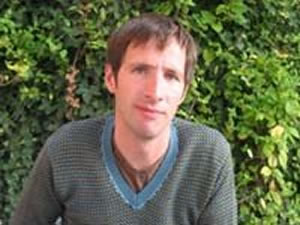
Paul Bogaert (Brussel, 3 mei 1968)
De Argentijnse dichter Juan Gelman werd geboren op 3 mei 1930 in Buenos Aires. Zie ook mijn blog van 3 mei 2009 en ook mijn blog van 3 mei 2010.
lament for sim simmons weeping
one autumn morning sim simmons
woke without eyes as if they had fallen in favor of the season
but no matter he said
and smoothed his memory
no matter no matter at all sim simmons would say
placing empty trees in eye sockets
trees he fed with stampedes
cries forgetfulness silent parts
nocturnal insects deaths bearers
made their rounds through the trees
no matter sim would say
spreading his tender wings
and circling the sky
if I were a cloud he would say if I were a falcon or catastrophe
what my heart eats away at he would say
you have quenched yourself dove sim simmons would say without weeping
I have no eyes to cry he would say but I should
he would say remembering everything vegetable
water weeping rain or river needs
a tender nest to guard against the cold
and so sim simmons began to weep
the trees flew all around him
and once again he had eyes to watch or to see or to suffer
and to weep without feeding anyone
I deserve it sim simmons would say late
I quite deserve it he would say with his eyes now dry
hard brilliant as the sun
beneath the Alabama land
two rivers were born where they buried him
one toward the north the other toward the south
for memory for oblivion
and everyone had water
but sim simmons did not:
he looked downward
now deserving or dead or sad
without trees without trees
Vertaald door Katherine Hedeen en Víctor Rodríguez Núñez
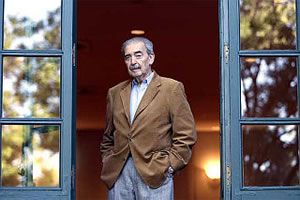
Juan Gelman (Buenos Aires, 3 mei 1930)
De Duits-joodse schrijver Soma Morgenstern (eig. Salomo) werd geboren op 3 mei 1890 in Budzanów in Oostgalicië. Zie ook mijn blog van 3 mei 2007 en ook mijn blog van 3 mei 2008 en ook mijn blog van 3 mei 2009 en ook mijn blog van 3 mei 2010.
Uit: The Third Pillar
Now the accusation can begin. But I perceive that a judge has not yet assumed his seat. Where is the seventh judge? The seventh seat was destined for Zacharia Hakohen, the Torah scribe. Thus spoke the Ab Beth-Din, the leading judge. But he seems to be delaying. Since danger is imminent, another judge must serve as a substitute. What danger do you see in delay? asked the narrating judge. The procedure must not be interrupted, said the Ab Beth-Din, because Higher Court, as we know from the Messenger, is waiting for the result of these proceedings. This publican will take the seventh seat as a substitute for judge. Therewith he pointed to the taciturn one among the publicans and said to him: Reb Senderl ben Hayim, the water carrier, known as Havryluk the publican, you have been found worthy to sit on this court as the seventh judge and to pass judgment.
This appointment came upon the taciturn publican with such grievousness, that he had to hold on the arm of the Messenger in order not to faint on the stairs. Then he broke into sobs and lamented aloud in order to be heard by the other judges and Almemor. And in his lamentation he accused himself: I have denied the Name of the Creator. For four years I have not lived according to the Law. For four years I hid myself under the name of Havryluk when the true Havryluk disappeared. I wanted to live, rather live under a false name than die with my brethren. And I am to be a judge, I?
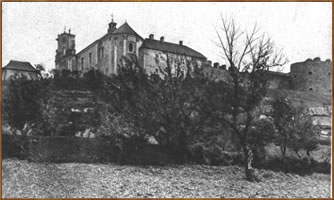
Soma Morgenstern (3 mei 1890 17 april 1976)
Budzanów
De Braziliaanse schrijfster Nélida Piñon werd geboren op 3 mei 1937 in Rio de Janeiro als dochter van Spaanse immigranten. Zie ook mijn blog van 3 mei 2009 en ook mijn blog van 3 mei 2010.
Uit: An Interview with Nélida Piñon
Paul Sneed One of the most provocative aspects of your works, in my opinion, is the presence of multiple narrative voices that often leap in time both backward and forward. How is this technique related to your view of the possibility of representing human life in art?
Nélida Piñon Well, this is exactly my intention. Look, I have learned through the years that one voice alone is insufficient. And I have realized that fiction tells a farce, a great lie of humanity. We lie in order to tell the truth. We lie, and when I say lie, its not a moral problem, we lie in order to tell many things at the same time, and, sometimes, just one voice is a collective voice. Depending on the abilities of the writer, in his or her art of narrating, he or she can make just one narrator speak as if that narrator were a Greek chorus. This is an artifice. It is a literary resource. One can still multiply these voices and make them appear individual, but in reality this voice represents a human group; that is, you can multiply these voices infinitely in search of the universality of the voices. In the end its all a choral movement, with all of us speaking at the same time.
But one must give order to the voices, discipline the voices, so that people understand what the voices are saying. So, when you tell a story, when you use these voices, you must impose some discipline, some order, because art is born of chaos, fortunately, because chaos is rich and fertile.
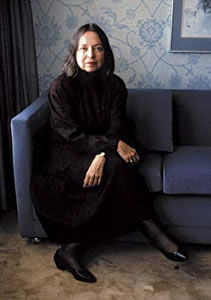
Nélida Piñon (Rio de Janeiro, 3 mei 1937)
De Engelse schrijfster Dodie Smith werd geboren op 3 mei 1896 in Whitefield. Zie ook mijn blog van 3 mei 2009 en ook mijn blog van 3 mei 2010.
Uit: I Capture the Castle
It is comforting to look away from the windows and towards the kitchen fire, near which my sister Rose is ironing though she obviously can't see properly, and it will be a pity if she scorches her only nightgown. (I have two, but one is minus its behind.) Rose looks particularly fetching by firelight because she is a pinkish person; her skin has a pink glow and her hair is pinkish gold, very light and feathery. Although I am rather used to her I know she is a beauty. She is nearly twenty one and very bitter with life. I am seventeen, look younger, feel older. I am no beauty but have a neatish face.
I have just remarked to Rose that our situation is really rather romantic two girls in this strange and lonely house. She replied that she saw nothing romantic about being shut up in a crumbling ruin surrounded by a sea of mud. I must admit that our home is an unreasonable place to live in. Yet I love it. The house itself was built in the time of Charles II, but it was grafted on to a fourteenth century castle that had been damaged by Cromwell. The whole of our east wall was part of the castle; there are two round towers in it. The gatehouse is intact and a stretch of the old walls at their full height joins it to the house. And Belmotte Tower, all that remains of an even older castle, still stands on its mound close by. But I won't attempt to describe our peculiar home fully until I can see more time ahead of me than I do now.
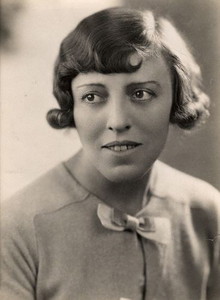
Dodie Smith (3 mei 1896 24 november 1990)
De Franse dichter en schrijver Pierre Emmanuel (eig. Noël Mathieu) werd geboren op 3 mei 1916 in Gan (Pyrénées-Atlantiques). Zie ook mijn blog van 3 mei 2007 en ook mijn blog van 3 mei 2008 en ook mijn blog van 3 mei 2009 en ook mijn blog van 3 mei 2010.
Hymne de la Liberté (fragmentt)
Ô mes frères dans les prisons vous êtes libres
Libres les yeux brûlés les membres enchaînés
Le visage troué les lèvres mutilées
Vous êtes ces arbres violents et torturés
Qui croissent plus puissants parce quon les émonde
Et sur tout le pays dhumaine destinée
Votre regard dhommes vrais est sans limites
Votre silence est la paix terrible de l éther.(1)
Par-dessus les tyrans enroués de mutisme
Il y a la nef silencieuse de vos mains
Par-dessus lordre dérisoire des tyrans
Il y a lordre des nuées et des cieux vastes
Il y a la respiration des monts très bleus
Il y a les libres lointains de la prière
Il y a les larges fronts qui ne se courbent pas
Il y a les astres dans la liberté de leur essence
Il y a les immenses moissons du devenir
Il y a dans les tyrans une angoisse fatale
Qui est la liberté effroyable de Dieu.
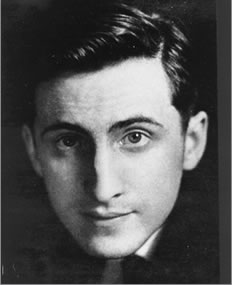
Pierre Emmanuel (3 mei 1916 24 september 1984)
De Duitse dichter en toneelschrijver August Friedrich Ferdinand von Kotzebue werd in Weimar geboren op 3 mei 1761. Zie ook mijn blog van 3 mei 2007 en ook mijn blog van 3 mei 2009 en ook mijn blog van 3 mei 2010.
Bundeslied
(In bekannter Weise)
Es kann ja nicht immer so bleiben
Hier unter dem wechselnden Mond;
Es blüht eine Zeit und verwelket,
Was mit uns die Erde bewohnt.
Es haben viel fröhliche Menschen
Lang vor uns gelebt und gelacht;
Den Ruhenden unter dem Rasen
Sey fröhlich dies Gläschen gebracht!
Es werden viel fröhliche Menschen
Lang nach uns des Lebens sich freun,
Uns Ruhenden unter dem Rasen
Den Becher der Fröhlichkeit weihn.
Wir sitzen so traulich beisammen
Wir haben einander so lieb,
Erheitern einander das Leben;
Ach, wenn es doch immer so blieb'!
Doch weil es nicht immer so bleibet,
So haltet die Freunde recht fest;
Wer weiß denn, wie bald uns zerstreuet
Das Schicksal nach Ost und nach West!
Und sind wir auch fern von einander,
So bleiben die Herzen doch nah!
Und Alle, ja Alle wird's freuen,
Wenn Einem was Gutes geschah.
Und kommen wir wieder zusammen,
Auf weise verhüllter Bahn,
So knüpfen an's fröhliche Ende
Den fröhlichen Anfang wir an!
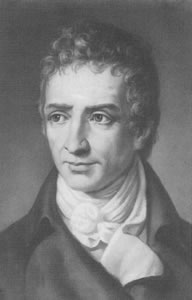
August von Kotzebue (3 mei 1761 - 23 maart 1819)
|



